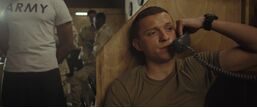Note: This article was originally published on the author's Sina Weibo
About the story behind "Sherry".
The movie "Sherry" is adapted from a semi-autobiographical war romance novel of the same name, written by Nicholas Walker, a veteran of the U.S. Army in the Iraq War, who is serving his sentence. The book is hailed as a model of American war PTSD literature in recent years.
The book is narrated in the first person. The protagonist of the story is an unknown white boy who was born in the middle class in Cleveland, Ohio. After graduating from high school, his parents sent him to a good private university in Cleveland, Ohio, where he met the love of his life-Emily, but also contracted alcohol and drugs. Unable to successfully apply for a job and complete his studies, he learned that a friend had joined the Marine Corps. In order to find a sense of mission, he signed up to join the Army and became a medical soldier.
In 2003, when the Iraq War broke out, he was sent to Iraq with the troops. In Iraq, he repeatedly performs seemingly useless but endless and bloody combat missions every day, watching adult movies, vacuuming computer dust, taking painkillers, and life in the battlefield is long and tormented. He quickly discovered that as an Army medical soldier, it was not so much a life-saving job as a corpse packer-putting the comrades who were torn apart by the IED into the body bag.
Fortunately, he survived the war alive, but he has to face more and more serious PTSD after returning to China. The endless battlefield nightmares that always hit at night, and the dark post-war life under the economic recession, made him need more painkillers and heroin to restrain depression and ease the embarrassment. In order to maintain the living needs of himself and his girlfriend, he began to choose to rob the bank (author's note: similar to the setting of the movie "The Male and Female Thief"). After robbing more than ten banks, the vicissitudes of life boy was arrested and imprisoned.
The story of the novel is actually Nicholas Walker's personal experience. On April 23, 2011, Walker entered a U.S. bank in the suburbs of Cleveland with a .45-inch Hi-Point pistol. After intimidating the teller to hand over cash, he walked out of the bank with the money and ran away quickly in a Ford F-150 pickup. In the process of evading police chase, due to operational errors, after colliding with multiple cars, he fell into a 5-foot-ditch and was unable to move. Subsequently, the police who came after hearing the news arrested him.
After the investigation, the police and prosecutors were surprised to find that Walker, as a veteran who had participated in 250 battles and won 7 military medals of various types, after retiring due to severe PTSD became the most bank robbery in Ohio history ( A total of 11 times, including 1 attempted single robber.
But this is indeed an unavoidable reality. A statistics in 2010 found that as many as 22 veterans in the United States commit suicide every day, most of whom suffer from PTSD. In fact, in 2012, the number of American soldiers who committed suicide exceeded the number of American soldiers who died in Afghanistan that year. Veterans Affairs Offices across the United States that cannot provide timely medical and financial assistance to veterans have also been the target of repeated exposure and condemnation by the media. The US military has countless cases of PTSD, but Walker's case is extremely bad and special in the eyes of experts. After the war, he did not choose to compromise to a broken life and did not commit suicide. Instead, he resisted the disease in a unique and mysterious way.
Walker is similar to the hero of his novel. In 1985, he was born in a wealthy middle-class family in Atlanta, Georgia. He is a happy boy who can realize any wish. Walker's grandfather was an infantry soldier who participated in World War II, and he had a close relationship with Walker. After Walker went to college for a year, because of his grandfather's influence, his dislike of closed university life, and his curiosity about the war in Iraq, he eloped with his girlfriend Kara and joined the army.
In December 2005, he came to Iraq with the 167th Armored Regiment of the 4th Infantry Division of the Army. The front line of the Ye Pai struggle. Walker originally thought he would be able to walk through the streets and alleys like his grandfather, but in fact his unit was mainly engaged in the task of searching and eliminating IED threats. As a medical soldier, he could not save many comrades, so he could only put the broken limbs of his comrades into the body bag. This is very different from what he expected before joining the army.
Two combat missions caused Walker's body and mind to be hit hard. One time was to deal with a car that was blown up by an IED. He had to carry four bodies that had been blown out of recognition with his hands under the disgusting smell of vaporized flesh. The first body can only recognize the eyes and eyebrows. Walker kept "looking" with the body's "eyes" when he was carrying it; the second body only had bones and muscles, and his face was indistinguishable. When Walker touched his intestines, It melted immediately in Walker's hands; the condition of the third body was a little better, with intestines intact; the last body was almost indistinguishable, a few pieces of meat stuck to the seat, Walker tied the meat and threw it into the nearby sewage he. All the genitals of the remains were burned, and Walker felt that it was a "walking out of hell" scene.
One is the task of monitoring and searching for IED makers. Walker's unit was allowed to cross fire freely at night. Unfortunately, an Iraqi broke into the line of fire and was hit by a rifle bullet. Walker immediately began to treat the Iraqi, but the Iraqi died after a few minutes of breathing. Walker must "accompany" the body until dawn before taking it back to the base. But after daybreak, when relatives of the Iraqis might come to snatch the remains, Walker and his comrades fell into a melee with several women and children. At this time, the bullet from the AK-47 rifle struck and Walker had to drag the remains. While retreating and shooting back, an old woman was unfortunately killed. Walker dragged the body through a canal, and he could even feel the Iraqi head bumping constantly with the ups and downs of the ground, and the sewage seeped into his undershirt.
In the fall of 2006, Walker returned to the United States. None of the things he planned to do would succeed, and his friends gradually became alienated. Walker wandered in a state of near-continuous paralysis, and finally Kara left him. It is difficult for him to fall asleep naturally, and he needs medication. Once he fell asleep, he was attacked by a nightmare on the battlefield. After waking up, he was covered with sweat, and his mind was still bloody and terrifying battlefield memories. He once went to the Veterans Affairs Office and related hospitals for treatment, but the other party did not diagnose Walker's worsening PTSD symptoms in time, but believed that he was anxiety or bipolar disorder. Because the drugs could not suppress depression, Walker began to get drugged.
Walker's spirit began to become confused with the aggravation of PTSD, and he would self-harm on impulse, or deliberately violate traffic regulations and go crazy racing. On the other hand, due to the memory of Iraq’s day-to-day indoor fighting, coupled with drug abuse, Walker began to have a violent tendency, and he always fantasized about killing people in the room. One morning in December 2010, Walker realized that bank robbery was the only thing he was qualified to do. It was the same as fighting, high-pressure and terrifying, but he was used to it and might be able to vent his anger.
The first time he successfully escaped from the robbery, Walker was actually satisfied. Bank robbery seemed to have become an impromptu PTSD therapy until he was arrested in April of the following year. During the arraignment period, Walker's PTSD test score was as high as 101 points (the standard is 65 points). Experts believe that war heroes are more likely to suffer from PTSD, because compared with other soldiers, the same courage and fighting will make them show stronger heroism, but once they return to the peaceful rear, it will cause a serious fall and a sense of chaos. And Walker's extreme behavior is closely related to the failure to treat PTSD in time. In 2012, Walker pleaded guilty and was eventually sentenced to 11 years.
During his sentence, with the invitation and assistance of a writer, Walker, who had never had a novel writing experience, spent four years before and after, using gloomy and anti-romantic brushstrokes on a typewriter to blend his own experience and write. The semi-autobiographical novel "Sheri" was rated by the "Washington Post" as "It reads as though a man's arm was cut through a dirty needle".
In August 2018, the Russell Brothers bought the rights to the book for $1 million.
View more about Cherry reviews











